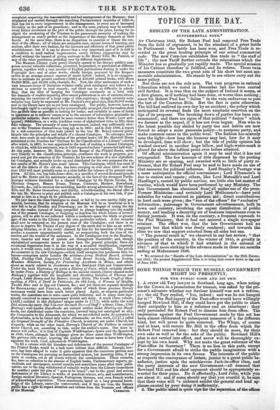TOPICS OF THE DAY.
RESULTS OF THE LATE ADMINISTRATION.
SUPPLEMENTAL NOTE.*
AT Christmas 1845, Sir Robert Peel had removed Free Trade from the field of argument, to be the standard of a great battle in Parliament : the battle has been won, and Free Trade is re- corded as the great leading principle of our actual commercial code. The new Corn-law establishes free trade in " the staff of life " ; the new Tariff further extends the relaxations which the Minister has so gradually yet rapidly made. The special mission. of his Cabinet therefore is fulfilled, and he retires. Those twin measures constitute the two great acts of his short but most me- morable administration. He stands by to see others carry out the same policy.
But those are not the sole acts. The vast progress in rational Liberalism which we noted in December last has been carried still further. It is true that on the subject of Ireland it seems, at a first glance, as if nothing had been done, or worse than nothing; since Sir Robert Peel has fallen " in the vain endeavour to pass the last of the Coercion Bills. But the fact is quite otherwise. The bill had outlived its own day by an accident; the policy which anticipated its reversal finds the most emphatic assertion on the lips of its proposer. The breaking down of parties has been con- summated; and there are signs of that political " fusion" which we foresaw as the sequel, if it has not even begun. Men who to the latest possible day abided by party ties and habits are now forced to adopt a more generous policy—to postpone party, and make common cause in the public weal. The fashion has scarcely seen the light—how long the humour may last, how far it may be developed, time will show; but the tide of public opinion has washed onward in another huge billow, and high-water-mark is placed far above the loftiest point ever before attained.
Of official administration again it may be said that it has not retrograded. The few honours of title dispensed by the parting Ministry are so sparing, and awarded with so little of party re- ference, that Sir Robert Peel may be said to have made no use of that resource for political influence. Lord Stanley's Peerage was a mere- anticipation for official convenience ; Lord Ellesmere's is due to station and repute ; others, like Lord Metcalfe's and Lord Hardinge's, earned by public service, are little else but matter of routine, which would have been performed by any Ministry. The late Government has abstained from, all undue use of the press. Former Ministries—and certainly Lord Melbourne's—have paid subsidies for value received in partisan'aid : direct contributions in hard cash were given; the "run of th6 offices" for "exclusive" information ; patronage in Government advertisements, both in town and country, involving the unjust distribution of public money, and lending a decoying air of business importance even to failing journals. It was, on the contrary, a frequent reproach to the Peel Ministry, that it had not secured a single newspaper retainer. The effect was, that the late Government had no support but that which was freely rendered ; and towards the close we saw that support extorted from all sides but one. " The general result is," we observed in our last review, " that the position of the country, in the winter of 1845, is greatly in advance of that to which it had attained in the autumn of 1841 ": still more striking is the advance made in these six months ending at Midsummer 1846.
• We reviewed the " Results of the Late Administration" on the 20th Decem- ber 1845: the present Supplemental Note is to bring that review down to the end of June 1846.


























 Previous page
Previous page